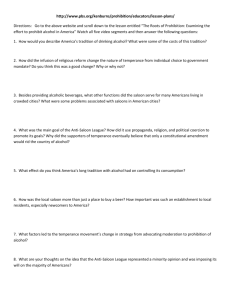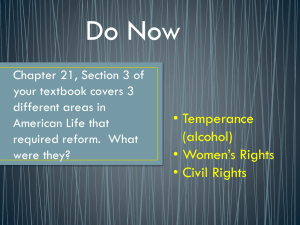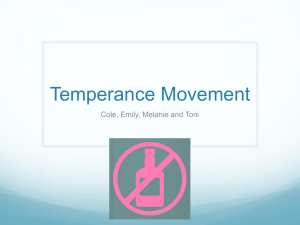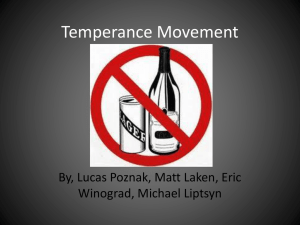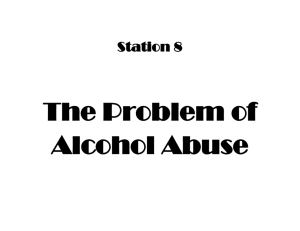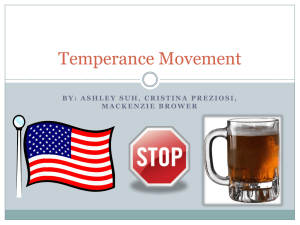PhD Studentship in collaboration with the British Library
advertisement
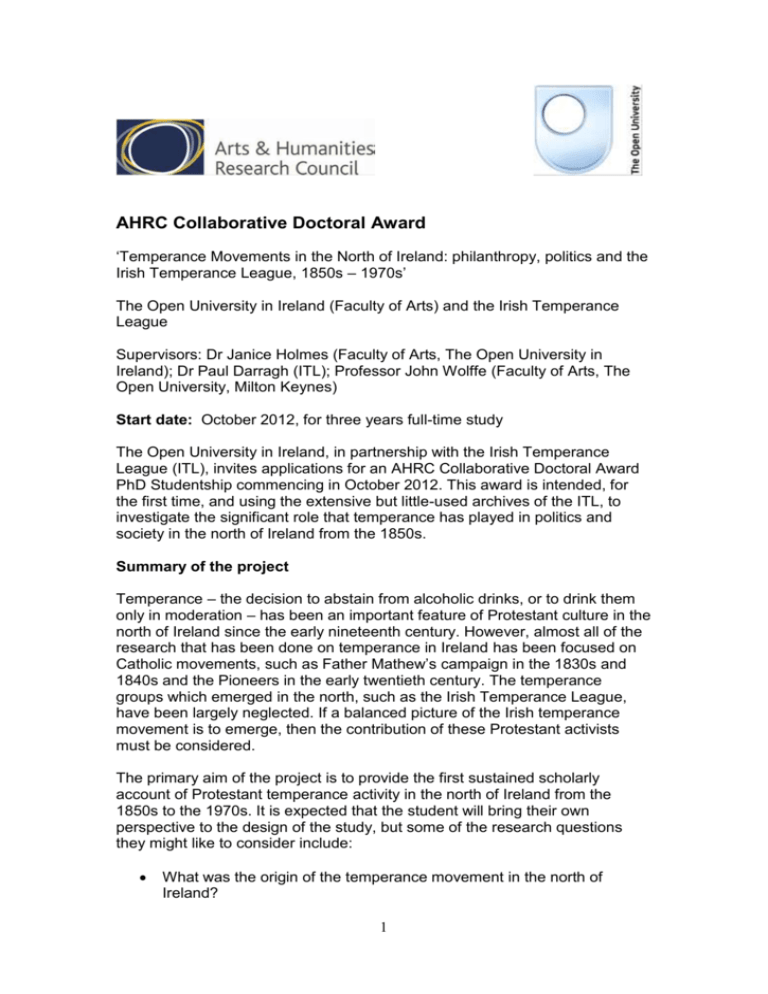
AHRC Collaborative Doctoral Award ‘Temperance Movements in the North of Ireland: philanthropy, politics and the Irish Temperance League, 1850s – 1970s’ The Open University in Ireland (Faculty of Arts) and the Irish Temperance League Supervisors: Dr Janice Holmes (Faculty of Arts, The Open University in Ireland); Dr Paul Darragh (ITL); Professor John Wolffe (Faculty of Arts, The Open University, Milton Keynes) Start date: October 2012, for three years full-time study The Open University in Ireland, in partnership with the Irish Temperance League (ITL), invites applications for an AHRC Collaborative Doctoral Award PhD Studentship commencing in October 2012. This award is intended, for the first time, and using the extensive but little-used archives of the ITL, to investigate the significant role that temperance has played in politics and society in the north of Ireland from the 1850s. Summary of the project Temperance – the decision to abstain from alcoholic drinks, or to drink them only in moderation – has been an important feature of Protestant culture in the north of Ireland since the early nineteenth century. However, almost all of the research that has been done on temperance in Ireland has been focused on Catholic movements, such as Father Mathew’s campaign in the 1830s and 1840s and the Pioneers in the early twentieth century. The temperance groups which emerged in the north, such as the Irish Temperance League, have been largely neglected. If a balanced picture of the Irish temperance movement is to emerge, then the contribution of these Protestant activists must be considered. The primary aim of the project is to provide the first sustained scholarly account of Protestant temperance activity in the north of Ireland from the 1850s to the 1970s. It is expected that the student will bring their own perspective to the design of the study, but some of the research questions they might like to consider include: What was the origin of the temperance movement in the north of Ireland? 1 How significant was the temperance movement within the political culture of the north? How influential were temperance organisations in the construction of an evangelical Protestant identity in the north? How did temperance work fit into wider debates about the role of philanthropy and, later on, social work and social reform? How have temperance movements adapted to changing social and cultural attitudes towards alcohol and alcohol consumption? Partnership with the ITL A Collaborative Doctoral Award is intended to promote and encourage collaboration between universities and non-academic organisations and businesses and to enable doctoral students to gain first-hand experience of a work environment. In this award, the OU in Ireland and the ITL will be working together to supervise the successful candidate’s academic progress and their exposure to a working environment. The successful candidate will be based in Belfast and will be provided with study facilities in both the OU and ITL offices. Regular supervision meetings will take place in Belfast, although it is expected that the successful candidate will travel to Milton Keynes for occasional training and supervision sessions. The ITL is a voluntary organisation which operates largely through project partners, which it funds. While the successful candidate will have the opportunity to observe the workings of the ITL, it is anticipated that they will spend more time observing the work of the ITL’s partner organisations, such as the Townsend Street Outreach Centre (TSOC), Belfast and Hope NorthWest, Derry. These are currently involved in alcohol awareness and addiction programmes in their local areas. Depending on the experience and interests of the successful candidate, and on the direction in which the research proceeds, it is anticipated that the candidate may become involved with the work of one of these partner organisations. It is hoped that the historical research combined with contemporary observation will feed into a wider assessment of temperance methodologies which the ITL can use to inform its future practice. It is anticipated that the successful candidate could undertake some participant observation in their second year of study. For this work, the candidate will need to obtain a criminal history disclosure certificate from Access NI, for which the ITL will pay. (Any additional training required would be provided by the ITL.) Outputs and Dissemination The primary outcome of this project will be a doctoral thesis. It is also anticipated that the successful candidate will, in negotiation with the ITL, produce a short history and report which explores the impact of temperance activity within a historical and contemporary context. It is anticipated that the 2 successful candidate will deliver at least one public lecture on their findings and that they will disseminate their work via a website and/or blog. Requirements Applicants should have: 1. a good first degree (BA/BSc Honours or equivalent at first or upper second class standard) in History or a related subject 2. a Masters qualification in a discipline relevant to the PhD topic (degrees about to be awarded are eligible) It would be an advantage to have: 3. previous experience of working with archival materials 4. experience of working with youth and/or community groups, or with a charity that addresses issues of substance abuse or misuse Stipend The stipend set for 2012-13 is £13,590. Please note that this studentship is subject to AHRC’s eligibility requirements and full funding is restricted to UK residents. (See: http://www.ahrc.ac.uk/FundingOpportunities/Documents/GuidetoStudentFundi ng.pdf) The award is available as a three-year AHRC studentship which must be held at The Open University based in Belfast. The Irish Temperance League provides an additional contribution to the student for travel and research expenses on top of the maintenance grant provided by the AHRC. How to Apply To apply for this studentship you must do the following: 1. Fill in and complete the standard Open University research degree application form available online at http://www.open.ac.uk/research/research-degrees/index.php. For advice on the applications procedure, contact the Research Degrees Team (research-degrees-team@open.ac.uk or 01908 654882). 2. As part of the online application process, you must, in no more than 2000 words, present a proposal of how you would approach this research topic. In it you should include your rationale and research questions alongside an outline of the existing historiography. You should discuss the relevant archives and primary sources and how you would use them to answer your research. You should also indicate how you intend to complete on time, such as a timetable of research activity. 3 Further Details For further details about research in the Faculty of Arts at The Open University, please go to http://www.open.ac.uk/Arts/research/index.shtml. For further information about the particulars of this CDA, contact Dr Janice Holmes, Faculty of Arts, The Open University in Ireland at janice.holmes@open.ac.uk. Closing Date The closing date for applications is 3 August 2012. Interviews will be held in the week commencing 2 September 2012. It is expected that the studentship will start in October 2012. Equal Opportunity is University Policy. 4
